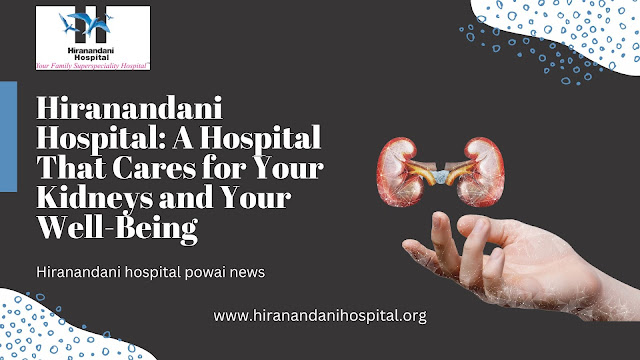A Comprehensive Guide to Maintaining A Healthy Kidney
One of the leading causes of death globally is chronic kidney disease. Chronic renal failure is a condition in which the full shutdown of the body's kidney function contributes to the accumulation of harmful substances that ultimately cause chemical abnormalities in the body and can lead to death. Life-long renal replacement therapy (RRT) in the form of hemodialysis, peritoneal dialysis, or renal transplantation is most frequently the solution for this disease. Without proper insight and comprehension of the pros and cons associated with the treatment, the decision to get kidney transplantation cannot be made.
Before kidney
transplantation, proper counseling, and insightful information are provided by
Dr. L H Hiranandani Hospital, Powai. News for the hospital was
recently been published for its contribution during the times of COVID-19 and
was felicitated by the Hon’ble Governor of Maharashtra. For kidneytransplant, Hiranandani Hospital is best as the doctors individually
evaluate, assess and advise each patient, providing them with the best possible
care, transplantation time, and follow-up advice post-transplantation.
CEO of HiranandaniHospital, Dr. Sujit Chatterjee shared some essential diet routines
that are needed to be followed for maintaining a healthy kidney.
- Indulge in Healthy Eating Habits
Significant risk
factors for kidney disease include diabetes, obesity, and uncontrolled
hypertension. Exhausting lifestyles and unhealthy dietary practices add to the
illness. To overcome the main causes of chronic kidney disease, a balanced and
nutritious diet plays a vital role.
- Keep an account of Diabetes and Blood Pressure
The risk of kidney
damage gets higher due to enduring diseases like diabetes and hypertension. In
order to minimize the chances of kidney failure, if you have a family history
of hypertension or kidney disease, strict and consistent monitoring and
adequate blood pressure or diabetes treatment is necessary.
- Exercise Daily
Cholesterol, blood
pressure, and body weight can be regulated by daily exercise. It also helps to
increase strength while improving immunity and reducing the body's
inflammation. The risk of developing diabetes and high blood pressure, both of
which are significant risk factors for kidney disease, is increased by being
overweight.
- Keep Optimum Fluid Intake
For a safe body,
drinking enough water is important. The optimum intake of fluid for a person
depends on many variables, such as climatic conditions, physical activity, and
type of body, and should ideally be proportional to the intake of sodium.
With these simple lifestyle changes and healthy eating habits, you can maintain a healthy kidney


Good post.
ReplyDeleteVisit Best Astrologer in Hassan.
Very best blog thanks for sharing keep posting.
ReplyDeleteVisit Best Vashikaran Astrologer in Bangalore
Nice post. Keep sharing. Thanks for sharing.
ReplyDeleteBest Astrologer in Cuncolim provides best results with 99% unique solutions.
Nice post.
ReplyDeleteFor Upvc Windows in Hassan. Contact us.
This comment has been removed by the author.
ReplyDelete